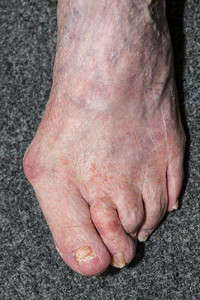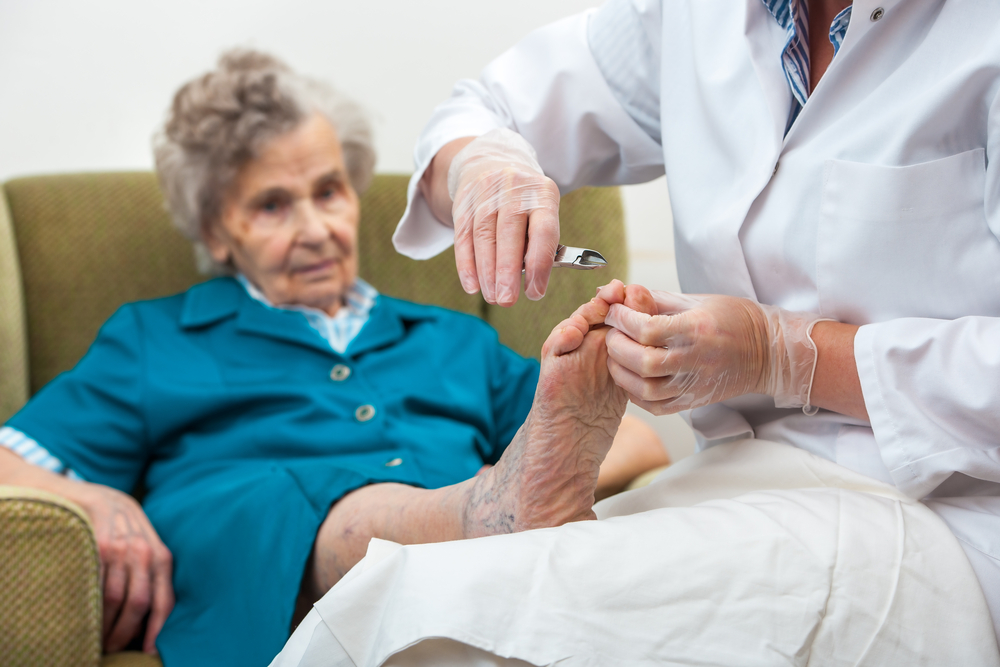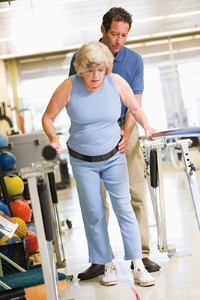





 While the exact cause of bunions is unknown, there are things that can exacerbate them. These may include improper footwear, such as pointed shoes, high heels, and shoes that are too narrow across the bottom of the toes. Since the toe typically bears most of the body’s weight, poor footwear can lead to increased wear and tear; this can increase the severity of bunions. Additionally, genetics may play a role because foot structure and shape are hereditary. It’s also common for bunions to become more pronounced for those whose occupations consist of standing or walking. Treatments can include adding padding in the shoes for protection, wearing a shoe with a flexible sole for support, and possibly stretching your shoes to make room for the bunion. If you think you have a bunion, it is recommended to consult a podiatrist for a proper evaluation.
While the exact cause of bunions is unknown, there are things that can exacerbate them. These may include improper footwear, such as pointed shoes, high heels, and shoes that are too narrow across the bottom of the toes. Since the toe typically bears most of the body’s weight, poor footwear can lead to increased wear and tear; this can increase the severity of bunions. Additionally, genetics may play a role because foot structure and shape are hereditary. It’s also common for bunions to become more pronounced for those whose occupations consist of standing or walking. Treatments can include adding padding in the shoes for protection, wearing a shoe with a flexible sole for support, and possibly stretching your shoes to make room for the bunion. If you think you have a bunion, it is recommended to consult a podiatrist for a proper evaluation.
If you are suffering from bunions, contact one of our podiatrists of Active Foot and Ankle Care, LLC. Our doctors can provide the care you need to keep you pain-free and on your feet.
What Is a Bunion?
A bunion is formed of swollen tissue or an enlargement of boney growth, usually located at the base joint of the toe that connects to the foot. The swelling occurs due to the bones in the big toe shifting inward, which impacts the other toes of the foot. This causes the area around the base of the big toe to become inflamed and painful.
Why Do Bunions Form?
Genetics – Susceptibility to bunions are often hereditary
Stress on the feet – Poorly fitted and uncomfortable footwear that places stress on feet, such as heels, can worsen existing bunions
How Are Bunions Diagnosed?
Doctors often perform two tests – blood tests and x-rays – when trying to diagnose bunions, especially in the early stages of development. Blood tests help determine if the foot pain is being caused by something else, such as arthritis, while x-rays provide a clear picture of your bone structure to your doctor.
How Are Bunions Treated?
If you have any questions, please feel free to contact our offices located in Fair Lawn, Riverdale, and Englewood, NJ . We offer the newest diagnostic and treatment technologies for all your foot care needs.
Read more about BunionsWhen there is an imbalance in the size of the nail and the enlargement of the skin edge, this may cause an ingrown toenail. Reasons for this may include the nail naturally growing inward, improper shoe fitting, and hereditary conditions. Other causes may be from an improper pedicure and/or poor foot hygiene. Common symptoms can be tenderness of the nail, swelling and redness. Additionally, drainage and pus may occur if there is an infection involved. Home remedies may include soaking the affected toe in lukewarm water, or applying antibacterial ointments for bacterial infections and antifungal ointments for fungal infections. Those who have diabetes or poor circulation are advised to consult a podiatrist even if the symptoms appear to be mild.
Ingrown toenails can become painful if they are not treated properly. For more information about ingrown toenails, contact one of our podiatrists of Active Foot and Ankle Care, LLC. Our doctors can provide the care you need to keep you pain-free and on your feet.
Ingrown Toenails
Ingrown toenails occur when a toenail grows sideways into the bed of the nail, causing pain, swelling, and possibly infection.
Causes
Prevention
Because ingrown toenails are not something found outside of shoe-wearing cultures, going barefoot as often as possible will decrease the likeliness of developing ingrown toenails. Wearing proper fitting shoes and using proper cutting techniques will also help decrease your risk of developing ingrown toenails.
Treatment
Ingrown toenails are a very treatable foot condition. In minor cases, soaking the affected area in salt or antibacterial soaps will not only help with the ingrown nail itself, but also help prevent any infections from occurring. In more severe cases, surgery is an option. In either case, speaking to your podiatrist about this condition will help you get a better understanding of specific treatment options that are right for you.
If you have any questions please feel free to contact our offices located in Fair Lawn, Riverdale, and Englewood, NJ . We offer the newest diagnostic and treatment technologies for all your foot and ankle needs.
Read more about Ingrown Toenail Care Geriatric (elderly) people may be prone to foot problems, which may include ingrown toenails, corns, and calluses. A reason for this may be their inability to cut their own toenails due to poor eyesight or loss of mobility. A qualified caregiver should be able to cut toenails properly. Ideally, toenails should be kept short, as more problems tend to arise if the nails are too long. The shorter they are, the less risk there is of breaking a nail. As we age, it’s beneficial to stay healthy and active. However, it’s important to remember to practice proper foot care. A podiatrist should be consulted to learn the best options for correct maintenance and treatments.
Geriatric (elderly) people may be prone to foot problems, which may include ingrown toenails, corns, and calluses. A reason for this may be their inability to cut their own toenails due to poor eyesight or loss of mobility. A qualified caregiver should be able to cut toenails properly. Ideally, toenails should be kept short, as more problems tend to arise if the nails are too long. The shorter they are, the less risk there is of breaking a nail. As we age, it’s beneficial to stay healthy and active. However, it’s important to remember to practice proper foot care. A podiatrist should be consulted to learn the best options for correct maintenance and treatments.
If you need your feet checked, contact one of our podiatrists of Active Foot and Ankle Care, LLC. Our doctors will attend to all of your foot and ankle needs and provide you with quality treatment.
Geriatrics and Podiatry
When people age, some common issues that may occur are bone density loss, dry skin, poor circulation, and rough brittle nails. These issues may also affect your foot health if the necessary steps are not taken to alleviate the problems.
It is important to take care of your feet because feet that are injured or diseased can affect your overall health. Having painful feet hinders your ability to do daily activities or may decrease your willingness to do the things that you need to do.
Visiting Your Geriatrician
As we age, health problems become more likely, so it is essential to visit your doctor for check-ups to ensure that you are doing the best you can to take care of your health. It is recommended to check your feet frequently for any possible cuts, bruises, swelling, corns or any other irregularities.
Taking Care of Elderly Feet
Cracked or dry feet can be treated by applying moisturizer often. It is also important not to wear old socks because the older the sock is, the higher the possibility there will be that there is bacteria there. Wear fresh socks and make sure they fit properly.
Proper foot health means that you can have a more active lifestyle and you will not be bogged down by pain. Foot health also leads to good circulation, which is paramount for overall health.
If you have any questions, please feel free to contact our offices located in Fair Lawn, Riverdale, and Englewood, NJ . We offer the newest diagnostic tools and technology to treat your foot and ankle needs.
Read more about Geriatrics and Podiatry Aging experts say that telling the elderly to take it easy and not exercise is bad for their long-term health. Many believe that aging causes a loss of strength and fitness, but some experts say it is actually the opposite. The elderly have an increased risk of falling due to slower reaction times and decreased fitness. Encouraging the elderly to find activities that promote exercise and to follow a good diet can help decrease the risk of falls. If you are older and wish to start exercising, check with a doctor to see if it is right for you.
Aging experts say that telling the elderly to take it easy and not exercise is bad for their long-term health. Many believe that aging causes a loss of strength and fitness, but some experts say it is actually the opposite. The elderly have an increased risk of falling due to slower reaction times and decreased fitness. Encouraging the elderly to find activities that promote exercise and to follow a good diet can help decrease the risk of falls. If you are older and wish to start exercising, check with a doctor to see if it is right for you.
Preventing falls among the elderly is very important. If you are older and have fallen or fear that you are prone to falling, consult with one of our podiatrists from Active Foot and Ankle Care, LLC. Our doctors will assess your condition and provide you with quality advice and care.
Every 11 seconds, an elderly American is being treated in an emergency room for a fall related injury. Falls are the leading cause of head and hip injuries for those 65 and older. Due to decreases in strength, balance, senses, and lack of awareness, elderly persons are very susceptible to falling. Thankfully, there are a number of things older persons can do to prevent falls.
How to Prevent Falls
Some effective methods that older persons can do to prevent falls include:
Falling can be a traumatic and embarrassing experience for elderly persons; this can make them less willing to leave the house, and less willing to talk to someone about their fears of falling. Doing such things, however, will increase the likelihood of tripping or losing one’s balance. Knowing the causes of falling and how to prevent them is the best way to mitigate the risk of serious injury.
If you have any questions, please feel free to contact our offices located in Fair Lawn, Riverdale, and Englewood, NJ . We offer the newest diagnostic and treatment technologies for all your foot care needs.






